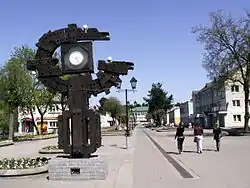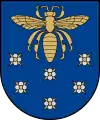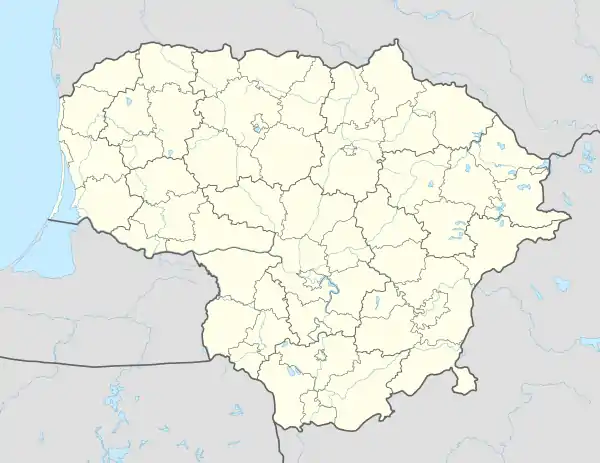Varėna
Varėna (![]() pronunciation ) (Polish: Orany, Yiddish: אוראַן Oran) is a city in Dzūkija, Lithuania.
pronunciation ) (Polish: Orany, Yiddish: אוראַן Oran) is a city in Dzūkija, Lithuania.
Varėna | |
|---|---|
City | |
 City clock | |
 Coat of arms | |
 Varėna Location of Varėna | |
| Coordinates: 54°12′40″N 24°34′20″E | |
| Country | |
| Ethnographic region | Dzūkija |
| County | |
| Municipality | Varėna district municipality |
| Capital of | Varėna district municipality Varėna eldership |
| First mentioned | 1377 |
| Granted city rights | 1946 |
| Population (2020) | |
| • Total | 7,892 |
| Time zone | UTC+2 (EET) |
| • Summer (DST) | UTC+3 (EEST) |
History
The town was founded in 1862 near the Warsaw – Saint Petersburg Railway, 4 km (2.5 mi) south of Sena Varėna (Old Varėna). At that time it was a small settlement, but following steady development it eventually became the center of the district. In the interbellum period, following World War I, the town was annexed by Poland, and renamed Orany. It was located near the then Polish-Lithuanian border, in the Wilno-Troki County (Powiat wileńsko-trocki) of the Wilno Voivodeship. In 1939, following the German-Soviet Invasion of Poland, Varėna was returned to Lithuania.
On September 9, 1942 all the Jews of the town of Varėna were collected in the local synagogue. On that day, even though the Germans had tried to prevent him from doing so, the priest Jonas Gylys entered the synagogue and encouraged the Jews to be brave in their last hours rather than convert to Christianity.
On the following day (or, according to another source, on the 9th itself) all of the Jews were taken from the synagogue to Eserekiai - a grove of trees near the village of Druckūnai, 1.5 kilometres (0.9 miles) from the town, on the side of the road leading to the village. Two large pits had been dug there 25 metres (82 feet) apart, one for the men and one for the women. Germans forced the victims in groups toward the pits and shot them there.
According to the report of Karl Jaeger, commander of Einsatzkommando 3A, 831 Jews from Varėna (and the surrounding areas) – 541 men, 149 women, and 141 children – were killed on that day.[1]
In 1946 around 2000 Poles were repatriated to Poland.[2]
Following industrialization in the 1970s, the town grew rapidly. Currently there are 9,240 residents in Varėna. The Varėna district is the largest and most forested region in Lithuania.
Gallery
 Municipality building
Municipality building Pedestrian February 16 st.
Pedestrian February 16 st. Library
Library
Notable people
- Lithuanian painter and composer Mikalojus Konstantinas Čiurlionis was born in Sena Varėna in 1875.
References
| Wikimedia Commons has media related to Varėna. |
- "The Untold Stories. The Murder Sites of the Jews in the Occupied Territories of the Former USSR".
- "Archived copy". Archived from the original on 2002-10-17. Retrieved 2007-03-09.CS1 maint: archived copy as title (link)

